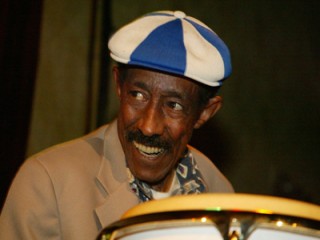
Carlos Valdes biography
Date of birth : 1926-11-04
Date of death : 2007-12-04
Birthplace : Havana, Cuba
Nationality : Cuban
Category : Famous Figures
Last modified : 2011-07-05
Credited as : Conga player, World Fusion, Latin Jazz
1 votes so far
Carlos "Patato" Valdes was the most influential conguero of his generation. In addition to his unrivaled rhythmic and melodic sensibilities, he also created the tunable conga, virtually reinventing the instrument in the process.
Valdes was born November 4, 1926 in Havana, where his father played guitar with local group Los Apaches. At 12, Valdes began studying congas under local legend La Sultana, honing a melodic flair that quickly set him apart from his peers. In 1946, he replaced the ailing Valentin Cane in the group La Sonora Matancera, and a year later signed on with Alberto Ruíz. In 1952 Valdes first visited New York City on tour with Conjunto Casino, and returned for good two years later -- another soon-to-be legendary conguero, Mongo Santamaria, recommended him to bandleader Tito Puente, and Valdes soon emerged as one of the orchestra's premier attractions. A superb, indefatigable showman, Valdes somehow managed to dance on top of his congas in the middle of performances, but he remained most renowned for his instrumental virtuosity. His first studio session, trumpeter Kenny Dorham's 1955 classic Afro-Cuban, vaulted him to the frontlines of the Latin jazz movement, and the Puente LPs Cuban Carnaval and Puente in Percussion further boosted his profile.
By the time Vadim's film hit theaters, Valdes was a member of bandleader Machito's influential Latin jazz orchestra; recommended to Machito by musical director Mario Bauzá, he remained in the lineup for five years. While most of his peers relied on one or two congas, over time Valdes expanded his arsenal to include three or even four drums, enabling a wider range of tones. He reached his greatest fame during a decade-long association with flautist Herbie Mann, appearing on best-selling LPs including Flautista!, Right Now, and The Beat Goes On. During the '60s, he also cut sessions in support of guitarist Grant Green, vibist Cal Tjader and tenorist Charlie Rouse. Only in 1967 did Valdes finally lead his own session, teaming with co-headliner and singer Eugene "Totico" Arango (a childhood friend from Havana) for the landmark Patato & Totíco, a groundbreaking rhumba date that abandoned the traditional formula of vocals and drums to add contributions from guitarist Arsenio Rodríguez and bassist Israel "Cachao" López. The record proved a turning point in Latin jazz history: "I had these ideas and wanted to advance them through jazz," Valdes said in a 1997 interview with the magazine Latin Beat. "I wanted something progressive." Despite the session's critical acclaim Valdes led precious few subsequent dates, waiting a decade to issue a follow-up, the 1977 Latin Percussion label effort Ready for Freddy.
Valdes began working on tunable conga prototypes as early as the late '40s. Up to that time, the drums were tuned by heating them over a source of heat, typically a Sterno can. During the mid-'50s he befriended mechanical engineer and photographer Martin Cohen, a Latin jazz buff and regular at Mann's Monday night jam sessions at the famed New York City jazz club Birdland -- when Cohen founded the instrument manufacturing firm Latin Percussion, he and Valdes collaborated on the pioneering LP Patato Model Congas, tunable fiberglass drums notable for their wide bellies and small bottoms. First released commercially in 1978, the congas are now an industry standard. After releasing his third LP Masterpiece in 1984, Valdes enjoyed his biggest mainstream stage ever when he appeared alongside Puente and jazz greats Art Blakey, Jimmy Heath, and Slide Hampton in a 1986 episode of the hit NBC sitcom The Cosby Show. Five years later, he also appeared on the big screen in The Mambo Kings. During the '90s he fronted the band Afrojazzia, and in 1995 recorded the first of two albums in the series Ritmo y Candela, with the follow-up appearing a year later. Both sessions received Grammy nominations in the nascent Latin Jazz category. Valdes continued touring into his 80s, at the end of his life leading the Conga Kings, a group including percussionists Giovanni Hidalgo and Candido Cameró, the latter a fellow octogenarian.
Valdes died of respiratory failure on December 4, 2007, one month past his 81st birthday.



















